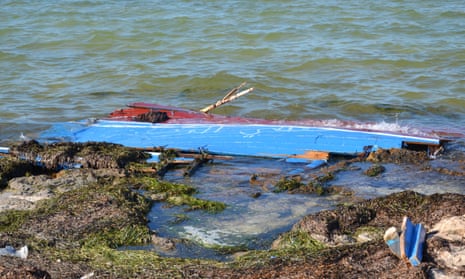As many as 70 people trying to reach Europe from Libya have drowned after their vessel capsized in the deadliest such incident in the Mediterranean since January.
According to survivors, at least 16 of whom were rescued, the boat left Zuwara in Libya, where renewed warfare between rival factions has gripped the capital, Tripoli, in the past five weeks. The vessel capsized 40 miles off the coast of Sfax, south of Tunis, as it headed towards Italy.
The survivors reported that a Tunisian fishing boat came to their rescue and transferred them to a Tunisian coastguard vessel.
The incident came as overall number of people reaching Europe has decreased, whilethe journey has become increasingly dangerous.
So far this year, 17,000 migrants and refugees have entered Europe via the sea, about 30% fewer than in the same period last year, according to the International Organization for Migration. The IOM said 443 people have reportedly died on Mediterranean crossings since 1 January, compared with 620 in the same period in 2018.
The Institute for International Political Studies (ISPI) thinktank said that one person died for every eight people who left Libya from January to April, based on analysis of figures from the Italian interior ministry.
Libya’s western coast is a main departure point for people from across Africa hoping to reach Europe.
Italy’s far-right interior minister, Matteo Salvini, has repeatedly declared Italian waters closed to NGO rescue vessels. Several boats have been left stranded at sea owing to this hardline approach, which is partly designed to force other parts of Europe to take in more refugees and migrants.
The rescue ship Mare Jonio, operated by Mediterranea Saving Humans, was docked in Lampedusa, on Friday morning, with 30 people on board who were saved the day before. Among them were two pregnant women, a one-year-old girl and four unaccompanied minors.
“The 30 survivors are about to land on Lampedusa. Their smiles give meaning to our work. They’re safe and that is the most important thing,” said one of the crew.
As has been happening for a year now, the ship was seized by the Italian authorities immediately after the landing and the captain investigated for aiding illegal immigration.
‘’The ship has been blocked and seized,” tweeted Salvini. “This will be their last trip. Bye Bye!”
Another boat carrying scores of people was reported in trouble off the coast of Libya. “Over 100 lives at risk, including 24 women and 8 children,” tweeted Alarm Phone, which relays distress calls from boats. “We were called this morning from a boat off #Libya. Communication difficult, calls repeatedly broke down. So-called Libyan coastguard not reachable.
“The people are in panic now. Their engine isn’t working and they can’t move. They are close to the Libyan coast.’’
Earlier on Friday, Babar Baloch, a spokesman for the United Nations high commissioner for refugees, said the UNhad repeatedly voiced its concerns about the lack ofrescue vessels to pick up people fleeing from “the horrendous and horrible situation” in Libya. The UNHCR called on governments to step in.
Although the fighting in Libya has made the situation more difficult for people traffickers and smugglers, international aid officials have warned that it could prompt more Libyans to flee their country.
According to the IOM, 2,297 people died or went missing in the Mediterranean last year out of a total of 116,959 who reached Europe by sea. It added that 117 people who left Libya in a rubber dinghy in January went missing and most remain unaccounted for.
